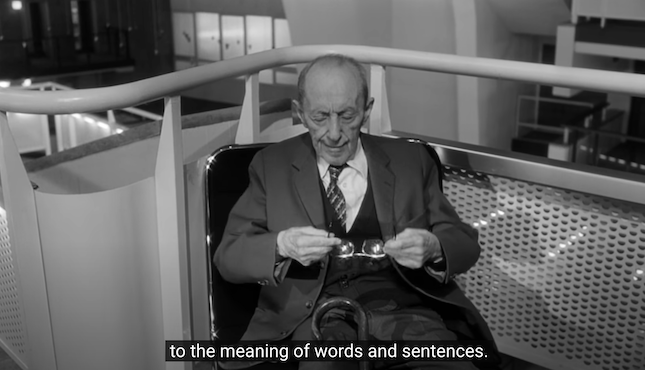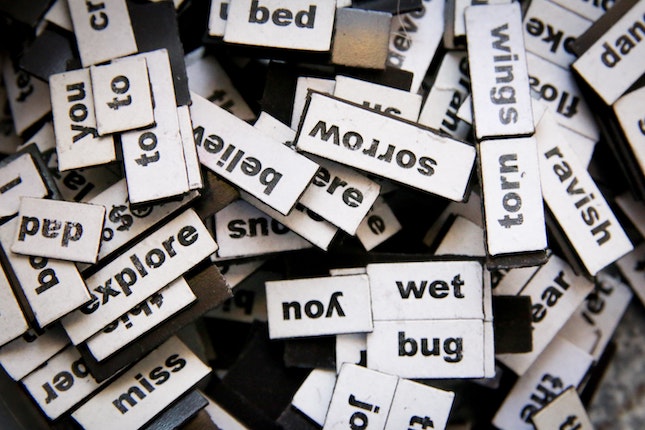Quick Start Editing: Toward the Meaning of Words and Sentences

The tale still rises from the depths…
A liturgy for which no one needs to be initiated to the meaning of words and sentences.
Wings of Desire. Wim Wenders
When you’re writing your story, you focus on getting the story down. You may not be thinking about words or syntax, you’re just writing.
But if you’re like me, there’s a placeholder sentence that bugs you. I wake up in the middle of the night, reconstructing the sentence. I won’t go back to sleep until I get up, go to my computer, and fix the sentence. I may do the same with placeholder words. Although I may not be as precise as Marcel Proust and his search for le mot juste—just the right word—I do have words that hold a place while I’m in writing mode.
While grammar checkers like ProWritingAid or AutoCrit may suggest sentence rewrites or word replacements, it’s always up to you, the writer, to ensure those suggestions match what you want to say.
We all have our own levels of editing focus. This weekend I was at a monthly Pacific Northwest Writers meeting, and the fellow beside me said he never wakes up in the middle of the night to fix a sentence. Lucky for him. He sleeps through the night.
Edit Your Way to a Better Manuscript
Self-editing your own writing before handing it off to an editor or publisher provides rewards and benefits. First, self-editing allows you to catch many of the smaller errors on your own—typos, grammar mistakes, consistency issues—saving the editor time and effort. When an editor receives a manuscript that has undergone an initial self-edit, they are able to focus their energy on higher-level tasks like structuring the narrative and improving word choice and flow.
Beyond making the editor’s job easier, self-editing your work also gives you the chance to really think critically about your writing and see opportunities for improvement and growth. When you edit your own text, you identify repetitions, redundant sections, and parts that drag or feel unnecessary. Self-editing prompts self-reflection that helps you become a better, more thoughtful writer.
Perhaps the greatest reward of self-editing, though, is gaining more control over your own work. When you can spot and correct most of the issues yourself before handing over your manuscript, you retain more autonomy over the final product. As an author, improving your manuscript through self-editing helps establish trust with your editor that you understand the common pitfalls writers fall into and are ready to think critically about your own work.
Self-editing brings numerous benefits that can pay dividends when your work is ready for publication. The initial investment of time and effort in editing your own manuscript allows for a smoother process and helps cultivate valuable writerly skills for future projects.
Iron Out the Worst Errors Before Hiring an Editor
Before bringing on an editor to polish your novel or nonfiction manuscript, you can save time and money by reviewing the draft to catch and correct many simple errors that tend to slip through on first drafts.
Self-editing your manuscript before hiring an editor allows you to identify consistency, grammar, typos, and flow issues. You’ll trim unnecessary sections and strengthen word choice. While a professional editor will provide an objective eye and crucial feedback on larger structural elements of your writing, you can minimize the lower-level fixes they must attend to by carefully editing your work before handing it off.
The following outline provides a systematic approach for you to self-edit your manuscript, focusing on improving clarity, conciseness, and consistency before an editor can offer higher-level editorial guidance.
1. Proofread for basic errors – correct typos, grammar mistakes, and punctuation errors. Run spell check and grammar check on your word processor.
2. Check for consistency – of names, places, dates, facts, numbers, spelling, etc. Make sure everything is consistent throughout the manuscript.
3. Evaluate structure and flow – read through your writing to see if the structure works and the flow from one idea to the next is logical and smooth.
4. Improve word choice and phrasing – replace vague or weak words with more specific and forceful ones. Condense repetitive or wordy sentences.
5. Gauge tone and voice – read your work aloud to hear if the tone and voice are appropriate for your intended audience. Make adjustments where needed.
6. Trim unnecessary content—get rid of redundant or irrelevant parts. Pare the manuscript down to the essential elements.
7. Check formatting – ensure your manuscript follows the proper format in terms of spacing, fonts, title page layout, headers, etc.
8. Make backups—save copies in multiple places in case of computer issues or if your editor requests further revisions.
9. Print a draft – printing out a physical copy can help you spot missed issues while reviewing it on screen. Do one final check for errors before sending it to your editor.
That covers the major areas to focus on when editing your manuscript before working with an editor. The goal is to catch obvious issues before handing it off so the editor can focus on improving the writing’s larger structure, prose, and overall quality.
Spruce Up Your Verbs and Adjectives
Some of the easiest ways to improve the quality of your writing are by identifying and replacing weak verbs, vague adjectives, and filler phrases. Start by searching for:
• Words ending in -ly: Replace adverbs ending in -ly with stronger action verbs wherever possible. Instead of “He spoke quickly,” say “He blurted” or “He rattled off.”
• Weak pronouns: Replace “there were/there was” and “it is/it was” with the actual subject to make your writing more concrete. Instead of “There were three options,” say “Three options existed.”
• Filler phrases: Eliminate phrases like “at that moment,” “all of a sudden,” and “without warning.” They bog down your writing without adding meaning.
• Vague adjectives: Replace overused adjectives like “amazing,” “beautiful,” and “special” with more descriptive and vivid options. Instead of “a beautiful girl,” say “a girl with chestnut hair.”
Once you’ve identified areas for improvement, brainstorm alternatives:
• For “quickly,” consider options like “raced,” “zoomed,” “flew.”
• Instead of “there were five possibilities,” try “Five possibilities presented themselves.”
• Swap “all at once” for specific details: “Without pause, the crowd roared their approval.”
• Rather than “an incredible view,” use sensory details: “A view that took her breath away.”
By making these types of targeted changes, you can transform flat, dull prose into writing that comes alive on the page. Start with a search for -ly words, weak pronouns, and filler phrases, then brainstorm stronger verbs, nouns, and specific details to replace the vague terminology in your draft.
Revise Your Work With The Love It Deserves
Editing your writing can be daunting, but remembering that your manuscript deserves your careful attention and best efforts can help motivate you through the process. Before an editor sees your work, you owe it to yourself to:
• Slow down and actually read each sentence, picturing the scene in your mind as you envision readers experiencing it.
• Imagine your readers picking up this work, excited to dive into the world you’ve created through your words. Give them sentences with precision and vivid details.
• Trust that this story wanting to be told comes from within you. Have faith in your ability to harness and refine your voice to the best of your capabilities.
• Focus on improving one thing at a time—cut redundant phrases, simplify complex sentences, replace worn-out adjectives—then move on to the next element that needs polishing. Make forward progress, one small revision at a time.
• Remember that no manuscript is ever truly “finished”; it’s ready to share. View self-editing as an opportunity for your work to keep growing and strengthening with each round of revisions.
• Give yourself permission to make changes, big or small. Your manuscript craves the care and intention only you can provide. Edit it with the love and attention it deserves from its creator, you.
By approaching self-editing with patience, an open mind, and a spirit of nurturing your own work, you’ll cultivate an invaluable skill that will benefit this manuscript and all your future writing endeavors. Your story yearns to be told – help give it the best chance to find its readers by revising it with the loving attention only its author can offer.
Need help with your mystery novel? Get the help you need to jump back into your mystery and get it done. My personal coaching is laser-focused on writing a mystery.




